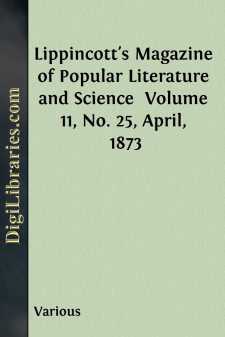Categories
- Antiques & Collectibles 13
- Architecture 36
- Art 48
- Bibles 22
- Biography & Autobiography 813
- Body, Mind & Spirit 142
- Business & Economics 28
- Children's Books 15
- Children's Fiction 12
- Computers 4
- Cooking 94
- Crafts & Hobbies 4
- Drama 346
- Education 46
- Family & Relationships 57
- Fiction 11829
- Games 19
- Gardening 17
- Health & Fitness 34
- History 1377
- House & Home 1
- Humor 147
- Juvenile Fiction 1873
- Juvenile Nonfiction 202
- Language Arts & Disciplines 88
- Law 16
- Literary Collections 686
- Literary Criticism 179
- Mathematics 13
- Medical 41
- Music 40
- Nature 179
- Non-Classifiable 1768
- Performing Arts 7
- Periodicals 1453
- Philosophy 64
- Photography 2
- Poetry 896
- Political Science 203
- Psychology 42
- Reference 154
- Religion 513
- Science 126
- Self-Help 84
- Social Science 81
- Sports & Recreation 34
- Study Aids 3
- Technology & Engineering 59
- Transportation 23
- Travel 463
- True Crime 29
Lippincott's Magazine of Popular Literature and Science Volume 11, No. 25, April, 1873
by: Various
Description:
Excerpt
WILMINGTON AND ITS INDUSTRIES.
SHIP IN DRY-DOCK: HARLAN & HOLLINGSWORTH COMPANY.Sleepy travelers on the great route to Washington, having passed Philadelphia and expecting Baltimore, are attracted, if it is a way-train, by a phenomenon. The engine is observed to slacken, and a little elderly man with a lantern, looking in the twilight like an Arabian Night's phantom with one red eye in the middle of its body, places himself just in advance of the locomotive. He trots nimbly along, defending himself from incessant death by the sureness of his legs, and after a long race guides up to the station the clattering train, which is all the time threatening to catch him by the heel. "Wilmington!" shouts the brakesman. Every train into Wilmington is thus attended, as the palfrey of an Eastern pasha by the running footman. The man's life is passed in a perpetual race with destruction, and having beaten innumerable locomotives, he still survives, contentedly wagging his crimson eye, and hardly conscious that his existence is a perpetual escape.
WILMINGTON DÉPÔT OF THE PHILADELPHIA, WILMINGTON AND BALTIMORE RAILROAD.Something quaint, peremptory, old-world and feudal strikes the traveler as adhering in this custom, by which Wilmington constantly pays for the general safety of her promenaders with the offering of a citizen's life and limbs. This impression is right. The city is the best-defined spot on the American map where the South begins and the North ends. Wilmington is, for its own part, a perfect crystal of Yankee grit, run out and fixed in a country which in the highest degree represents the soft, contented, lazy, incoherent Bourbon temper. We select it for our subject because it is so complete a terminal image. There is no other instance in the country of such sharp, close contrast. A man might step out to the city limit, and stand with one leg in full Yankeeland, thrilling with enterprise and emulation, and the other planted, as it were, in the "Patriarchal Times." Elsewhere along the effaced line of Mason and Dixon the sections die away into each other: here they stand face to face, and stare.
THE BRANDYWINE, AND LEA'S MILLS.Wilmington's legend belongs to the general story of the settlements along the Delaware. The discoveries of its site overlapped each other, the Quakers discovering the Swedes, who had discovered the Dutch, who had discovered the Indians. It was first called Willing's Town, from a settler, and then Wilmington, from the earl of that name in England, to whom Thomson dedicated his poem of Winter. But the spirit of enterprise—the spirit whose results we are now to chronicle—came in only with William Shipley, for whose story we must refer the reader, strange as it may seem, to the latest novel of the first living master of English fiction.
This introduces to our notice the most singular literary partnership that ever was or ever will be. Dumas used to be helped out in his splendid fictions by Maquet, but Dumas and Maquet were Frenchmen, and had plenty of sympathies in common....












